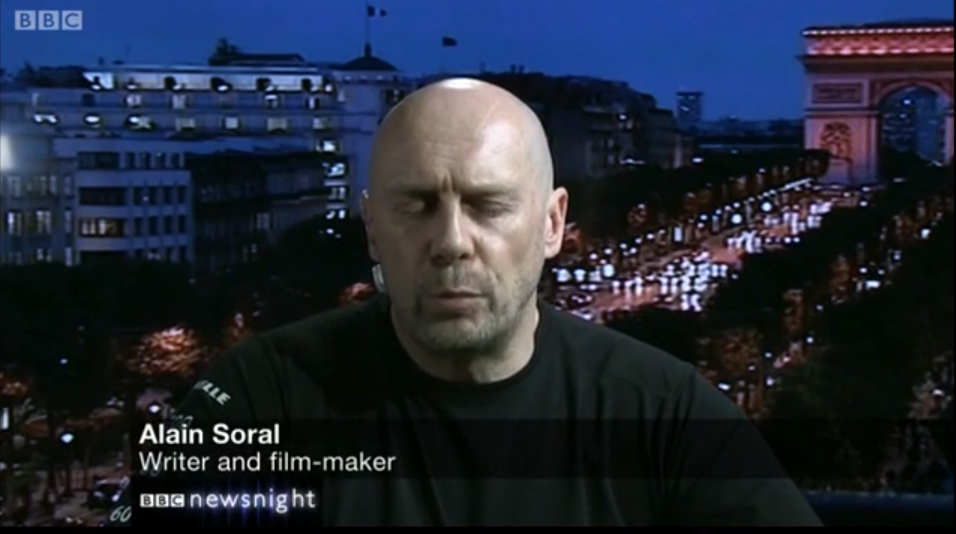A Guest post by AKUS
In December last year I wrote a column headed The Washington Post’s coverage of Israel: Slouching towards the Guardian? about the unusual way the Washington Post covered Israel’s use of drones over Gaza and pointed out that “it seems to have become strikingly similar in content and tone to the Guardian”.
This was followed by Scott Wilson, The Washington Post’s anti-Israel attack dog: Slouching towards Harriet Sherwood?, which showed the resemblance between Scott Wilson’s coverage of Israel and the Harriet Sherwood‘s approach in the Guardian. Scott provided a polite rebuttal to the idea that he is the Washington Post’s “attack dog, but the tone and method employed in the article was strikingly similar to the typical Guardian article – inaccuracies, no context, and a half-hearted editorial apology after CAMERA called them out (which is more than the Guardian provides in most cases).
On April 4th, 2012, the Washington Post published a Guardian-like article by Richard Stearns about Easter in Jerusalem: “A dark Easter for Palestinian Christians” in its problematic “On Faith” section which was replete with … yes, inaccuracies, no context, and, in place of an apology, a furious rebuttal by Israel’s US Ambassador, Michael Oren.
The Washington Post’s “On Faith” section has been a fertile ground for anti-Semitic articles and below-the-line anti-Semitic commentary.
In March 2011 the paper instituted a moderation policy in order to clean things up below the line, but Stearns’ article shows that they have a long way to go in fixing what is wrong above the line. His article resembles the annual articles that appear in the Guardian at Easter and Christmas about the plight of the Christians in the West Bank. Their problems are always presented as Israel’s fault, rather than due to the widely reported policies and actions of the Moslem Arabs in Gaza and the West Bank intended to drive Christian Arabs out.
For example, last Christmas, the Guardian’s Phoebe Greenwood wrote ‘If Jesus were to come this year, Bethlehem would be closed‘ even though there were an estimated 100,000 visitors to Bethlehem – more than ever, and compared to 70,000 the year before – and accommodation was impossible to find.
In response to Stearns’ article, on April 5th, 2012, the Israeli Ambassador, Michael Oren, termed the article “libelous”:
“The claims made in a recent article by Richard Stearns (“A dark Easter for Palestinian Christians”) are completely without foundation and are libelous to the State of Israel.”
Stearns first bemoaned the need for security checks for Arabs entering Jerusalem from the West Bank (amusing to anyone who has had to pass thorough the security checkpoints to attend the July 4th celebrations on the Washington, DC Mall after 9/11) and followed with outlandishly incorrect data about the number of permits issued to West Bank Christians.
Stearns made no effort at all to explain why Israel maintains checkpoints and security barriers to protect the Christians and other visitors that flock to the Old City of Jerusalem year round, but especially during festivals such as Easter and Christmas. Instead, he describes the security measures and number of visitor permits (visas, in effect) in a way that makes it appear that Israel is deliberately trying to prevent Christians from visiting the Church of the Holy Sepulchre at Easter to witness the ancient “Holy Fire” ritual:
Because of travel restrictions in past years, the vast majority of Christians living in the West Bank have been stopped at checkpoints and prevented from attending one of the most important religious services of the year. Israeli authorities require permits for entering Jerusalem. Local Christians estimate that only 2,000 — 3,000 permits are provided, despite the overwhelming desire among the 50,000 Palestinian Christians to travel from the West Bank and Gaza for the Easter week celebrations in Jerusalem.
Those who make it across checkpoints and into Israel are still barricaded by numerous walls and other security obstructions. As a result, even many who have permits are unable to make it to the Church of the Holy Sepulchre. In 2010, a Palestinian colleague of mine at World Vision, who had warm memories as a child of the Holy Fire service, was able to return to the Holy Sepulchre. She described the scene for those able to gain entrance to the church: “The crowd, striving to stay joyful, could still feel the change of what Easter had now become and the dark cloud of checkpoints, police forces, and denial of entry that had obscured the joy of this holiday.”
Now, in fact, as Oren pointed out, this is libelous and the description of the celebrants is nonsense. First, the number of permits cited by Stearns is wrong by an order of magnitude:
“Israel has provided more than 20,000 permits this year for Palestinian Christians to enter Jerusalem for the Good Friday and Easter holidays. Five-hundred similar permits have also been issued to the remaining Christians of Gaza, though the area is under the control of the terrorist organization Hamas.
Second, the “dark cloud” he refers to is belied by the joyful pictures of the worshippers inside the Church of the Holy Sepulchre during the “Holy Fire” ceremony
Yes, there were police on hand to keep order, and protect against any terrorists who might feel this would be an opportune time to create a massacre in a crowded church that would discourage Christians from visiting Israel.
Moreover, police have been required, upon occasion, to intervene in violent confrontations between Christians of different sects over some slight or perceived infringement on their historical claims to some particular section of the Church or its property, as shown in the conflict between Greek and Armenian monks in this clip from 2008 or this fight in the Church of the Nativity in Bethlehem in December 2011, when Palestinian police had to intervene.
Third, I found particularly infuriating his insinuation that Israel is persecuting Christians, when in fact it is the only country in the Middle East in which Christians are not only free to practice their religion, but their numbers are increasing:
While the ancient Christian communities around Jerusalem await the miracle of the Holy Fire this week, I pray for another miracle — one that would give full religious freedom to the Christians in the West Bank and Gaza.
This is utterly outrageous. The reason that Christians in the West Bank and Gaza do not have religion freedom is because the Arab authorities there – the PA, Fatah, and Hamas – have made it their policy and practice to make it less and less acceptable for Christians to live there.
Moreover, in the main section of its own paper, not the problematic “On Faith” section, the Washington Post had the following article which describes the visit to Jerusalem this Easter by Copts from Egypt:
Defying church ban, Egyptian Christians defy church ban and travel to Jerusalem
JERUSALEM — After the death of their spiritual leader, more than 2,000 Egyptian Copts have poured into the Holy Land for the Easter holidays, defying a ban he imposed on visiting Jerusalem and other Israeli-controlled areas.
The influx — after decades when Egyptian pilgrims were a rarity — adds a new element to the already diverse mix of languages and faiths in Jerusalem’s Old City during the holy season. The pilgrims are clearly distinguished by the Egyptian accent of their Arabic and long cotton robes worn by many of the men.
…
The Copts, mostly middle-aged or senior citizens have been busy milling around the Holy Sepulcher throughout the week. They have trundled to Bethlehem’s Church of the Nativity, built on the site where they believe Jesus was born. They have shopped and haggled on the way, charming many Palestinians with their Egyptian accents and humor, made familiar throughout the Arab world through generations of popular Egyptian movies and soap operas.
So what is going on at the Washington Post?
Once again I am left wondering, since it still has relatively frequent articles that fairly represent Israel from columnists like Jackson Diehl and blog extracts from right-wing bloggers like Jennifer Rubin and even occasional editorials that fairly represent Israel’s positions and concerns. There is even an Easter article by a Christian woman with a Jewish aunt pointing out the dangers that Easter has posed for Jews, At Easter, remembering Passover, due to the reading of the story of the crucifixion:
As at many churches, my church had just read the Passion narrative according to the Gospel of John: “[T]he Jews . . . cried out, ‘Away with him! Away with him! Crucify him!’ ” The vilification of “the Jews” in John’s Gospel has had murderous consequences through the ages — and although Christians turned on Jews at many times of year, the Triduum was especially violent. As the 15th-century Rabbi Joseph Cohen said about Good Friday, “Every year we live in fear of this day.”
As I left church on Friday, I was worrying about what we have forgotten: the killing that our ecclesial forebears undertook on Good Fridays past. We have forgotten that sermons and liturgies prompted this killing.
Yet the editors seem to be unaware of how articles like Stearns’ Easter article, usually found in the “On Faith” section, are put forward to revisit old Christian antagonisms to Israel and Jews and a Guardian-like view of Israel and the Palestinians.
Data about Israel and the West Bank are copious and easy to find, and errors of a factor of ten and obvious bias and misrepresentation should not be tolerated. The Washington Post needs to tighten up its reviews of articles about Israel Judaism, especially in the “On Faith” section.
It should institute clear policies that demand accuracy, truthfulness, and lack of bias from all its contributors and journalists writing about Israel and Judaism if it is not to become a copy of the Guardian in its treatment of the Middle East and Israel in particular.






